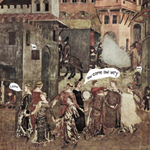|
|
 |
Dusted Reviews
Artist: Phosphorescent Album: Aw Come Aw Wry Label: Misra Review date: May. 26, 2005 |

|
|
|
 |
Phosphorescent received a warm critical reception for their 2004 EP The Weight of Flight, drawing comparisons to Will Oldham, Neutral Milk Hotel and Bob Dylan. Aw Come Aw Wry, their second full-length and first release for Misra Records, further refines songwriter Matt Houck’s eccentric Southern aesthetics, and manages to work a ragged batch of off-kilter, sometimes rowdy ballads into an intriguing album that sounds as familiar as it does experimental.
Houck’s voice, full of drawls and cracks, may never escape comparisons to Oldham, but as was the case with their two previous releases, Phosphorescent do more than merely tread among the Southern alt-folk canon. Houck takes some artistic license on Aw Come Aw Wry that adds a sense of inspiration to a sound that is steeped in tradition, even if some of the album’s detours seem slightly off track.
Woozy opener “Not A Heel” immediately sets the mood, a stark piano ballad with short brass flourishes that highlight Houck’s vocals and playfully sincere lyrics (“I am not a monster, but I will eat your heart”). The church organ that ended The Weight of Flight is all over Aw Come Aw Wry, and the finale, "Endless Pt. 2," peaks with a choir repeating the same wordless gospel for over six minutes. These traces of the church, combined with Houck’s pastoral imagery, keeps the album from drifting into morose balladry.
Phosphorescent return to the album's title over and over like a mantra. Three tracks are devoted to the melody, “Aw Come Aw Wry #5,” “#6,” and “#3” (in that order), all with different arrangements that bridge the following track, and some other songs often work in memorable phrase. For all its flights of fancy, and there are many, Aw Come Aw Wry still sounds like a singular journey, unified in its search for something pristine in roughhewn simplicity.
Phosphorescent ends the album with a field recording entitled “Nowhere Rd., Georgia, Feb. 21, 2005,” 20 minutes of rain, birds, and wind. An odd choice, for sure, and just another example of a band struggling to make something new with familiar means.
By Jon Pitt
|







